EPDM gaskets are flexible, reliable solutions that give exceptional stability and strength to an application. This article thoroughly explores the EPDM gasket, including its properties and uses.
What is EPDM Rubber?
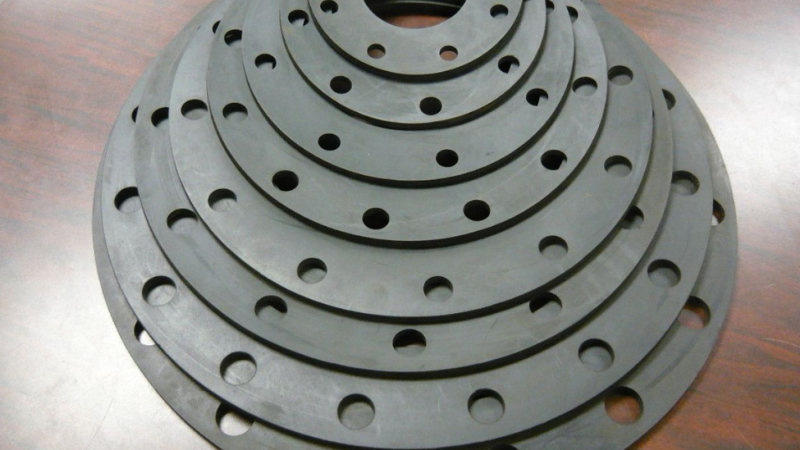
EPDM is an acronym for ethylene propylene diene monomer. This durable material is synthetic with exceptional properties that make it ideal for manufacturing a wide range of sealing solutions, including o-rings, gaskets, and seals.
Properties of EPDM rubber include its ozone and ultraviolet light resistance, high-temperature resistance, excellent electrical insulation, and excellent chemical resistance to polar solvents.
What is EPDM Gasket?
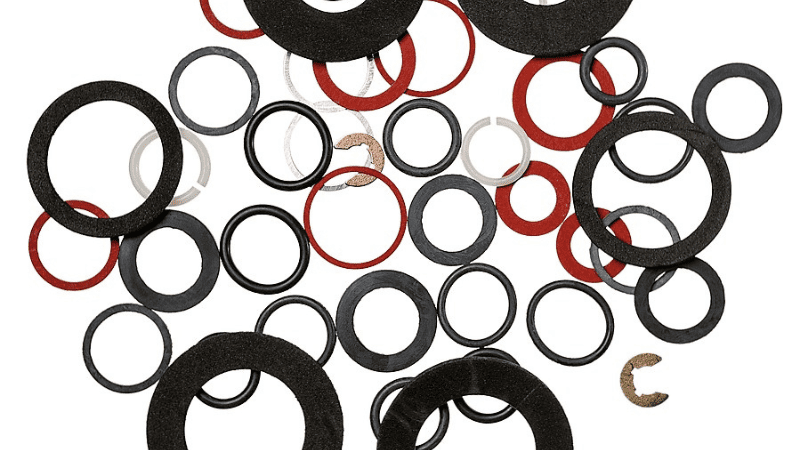
A gasket is a mechanical sealing solution that seals gaps between two surfaces. This sealing solution prevents leakages when the joined surfaces are under compression. Gaskets are made from different materials, including plastic, metal, and rubber.
The most popular rubber gasket materials are silicone, EPDM, and neoprene. EPDM gasket is a highly resistant gasket suitable for heat and chemical applications. This gasket is made from EPDM rubber and has properties including electrical insulation, flexibility, and weathering resistance.
Where are EPDM Gaskets Used?
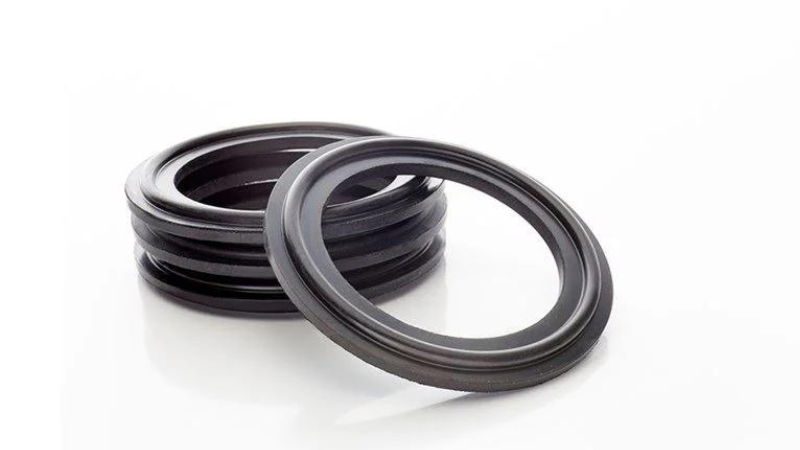
EPDM gaskets are used in several outdoor and external applications due to the excellent weathering and ozone resistance of their material. In addition, this gasket is cost-effective and offers outstanding performance in electrical applications.
Other applications of EPDM gaskets include roofing, cooling system hoses, and HVAC systems. This gasket is also used to manufacture non-slip coatings, plumbing, and vehicle door and window seals. Furthermore, EPDM gaskets are used in several automotive, medical, and electronic applications because of their flexibility and durability.
EPDM Gasket Material Properties
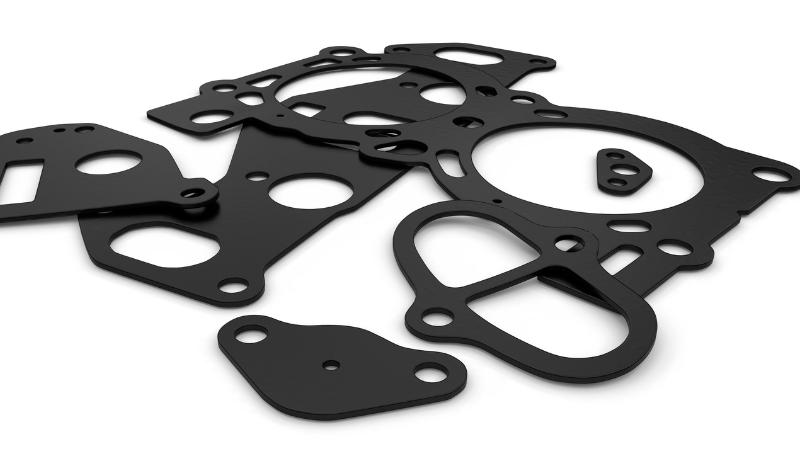
The table below summarizes the properties of EPDM material.
| Property | EPDM gasket material |
| Hardness | 30 – 90 Shore A |
| Abrasion resistance | Good |
| Compression set | Good to Excellent |
| Tear resistance | Fair to Good |
| Chemical resistance | Excellent for diluting organic and inorganic acids. Poor resistance to hydrocarbons, fuels, and mineral oils |
| Temperature range | -50 degrees C to 150 degrees C |
| Flame resistance | Poor |
| Gas permeability | Fair to Good |
| Ozone resistance | Good to Excellent |
| Steam resistance | Excellent |
| Water resistance | Excellent |
| Weather resistance | Excellent |
Advantages of EPDM Rubber Gaskets
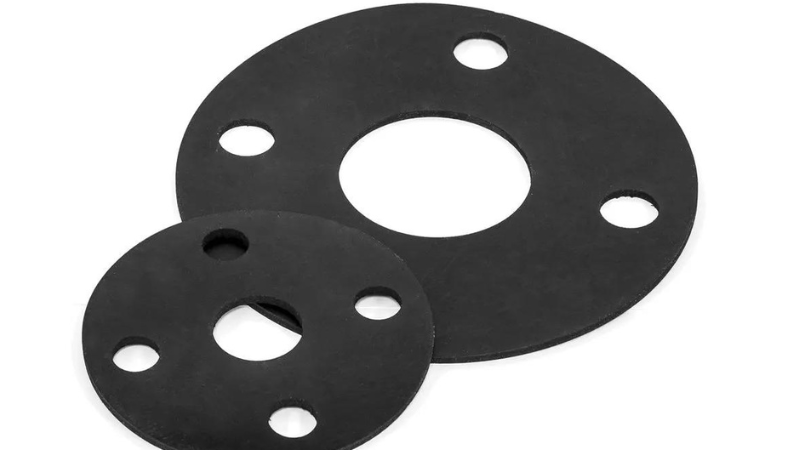
EPDM rubber gaskets are more water-resistant than other types of rubber. Therefore, they are ideal for plumbing and roofing solutions.
The gasket is suitable for outdoor use due to its good resistance to ozone and weathering. The gasket retains its form and shape even after exposure to UV rays.
EPDM gaskets have high-temperature stability. Therefore, they are suitable for use in steam applications.
Gaskets made from EPDM rubber are color-stable. They do not stain sealing surfaces.
This type of gasket has excellent electrical properties. Therefore, it provides good electrical insulation.
Disadvantages of EPDM Rubber Gaskets
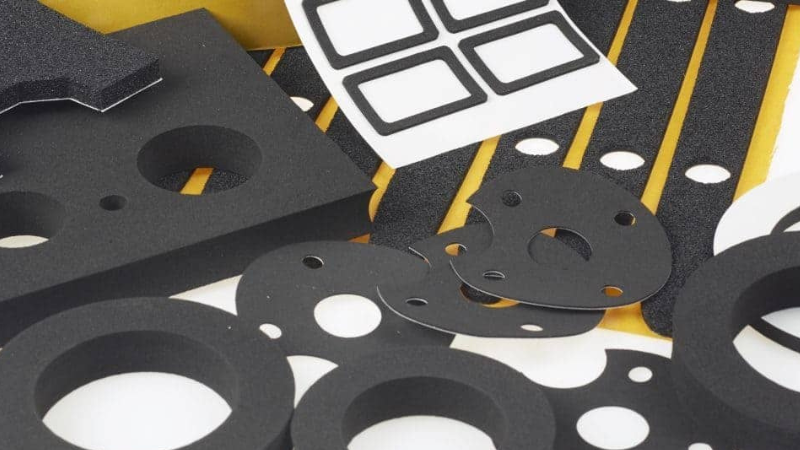
EPDM gaskets are not perfect for all applications. For instance, standard EPDM gaskets are unsafe for food processing except for FDA-approved gaskets. Furthermore, this gasket cannot withstand automotive fluids like hydrocarbon fuel and oil. The gasket breaks down on exposure to these fluids.
EPDM Gasket Material Types and Grades
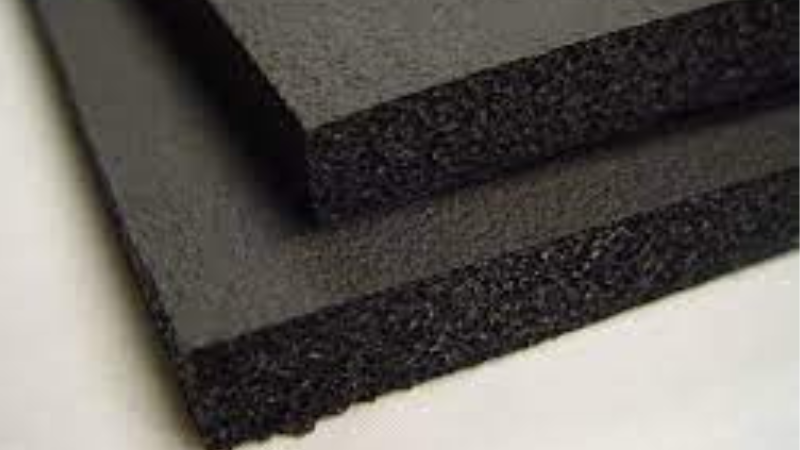
EPDM gaskets are made from different types of materials. These materials have distinct molecular structures and different physical properties, including hardness. In addition, the EPDM gasket has several available grades.
MATERIAL TYPES
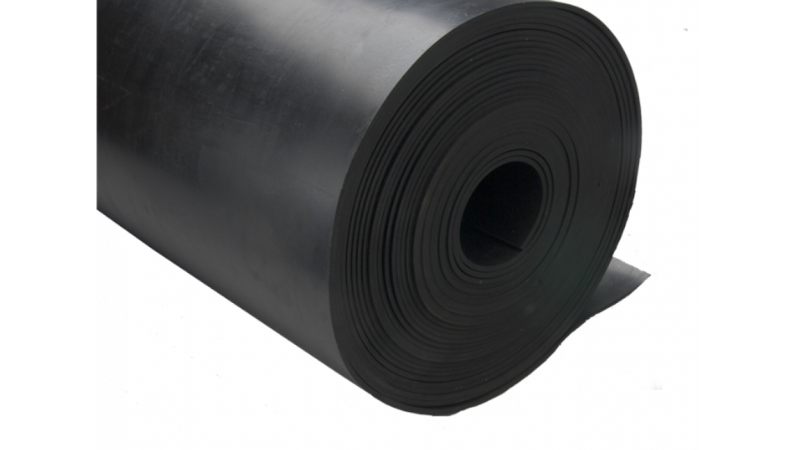
EPDM gaskets are made out of solid, sponge, or foam rubber.
Solid EPDM gasket: this type of gasket is made from solid rubber. Solid rubber is not just hard; it can also be soft or medium. The difference between them is their hardness. In addition, solid rubber has physical properties, including force distribution, density, and rigidity.
Solid EPDM gaskets have superior resistance to tear and abrasion. They also resist permanent indentation and can repel sudden impacts. This type of gasket is used for fluid containment and surface protection.
Sponge EPDM gasket: although sponge rubber is softer than solid rubber, it is not the case in all instances. For example, a 30-durometer solid rubber is not as hard as a 40-durometer sponge rubber.
Another distinguishing factor between these rubber material types is their ability to return to their original thickness after removing a compressive force. Sponge rubber has better cushioning than solid rubber, but this gasket can fail when over-compressed.
Sponge EPDM gaskets are ideal for soundproofing, cushioning, vibration dampening, and shock absorption. This gasket is also used in thermal insulation and filters application.
Foam EPDM gasket: foam rubber is similar to sponge rubber. They both have low densities. The most significant difference between them is the blockage of liquid flow. Although sponge rubber blocks liquid and gas flow, foam rubber allows fluids to pass freely.
A foam EPDM gasket provides excellent vibration control and shock absorption. Because the foam remains rigid even when compressed, it is ideal for manufacturing seals used in freezers and refrigerators. It is also used in insulation and noise-reduction applications.
GASKET GRADES
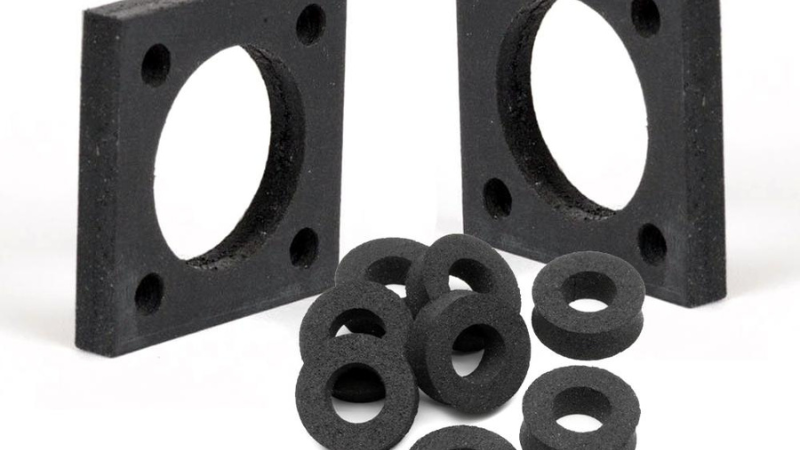
EPDM gasket grades include commercial, FDA-approved, peroxide-cured, and UL94 flame-retardant.
Commercial EPDM gasket
A commercial EPDM gasket is a cost-effective, economic-grade gasket. It is made from a blend of EPDM and styrene butadiene rubber (SBR). This gasket grade has excellent ozone and weathering resistance. It is also suitable for medium-range applications like low-pressure pipe seals and weather strips.
FDA-approved EPDM gasket
The FDA sets strict standards for materials used in the food processing industry. FDA-approved EPDM gaskets have many benefits, complying with FDA regulations. This gasket grade has good abrasion resistance and a smooth finish. It is also suitable for use with greasy and oily foods.
Peroxide-cured EPDM gasket
When EPDM rubber is cured with peroxide, it has an improved compression set and temperature. Although this gasket grade offers excellent chemical and heat resistance, it is difficult to produce and expensive. Nevertheless, a peroxide-cured EPDM gasket is suitable for long-term use in applications using hot water, engine coolants, alcohol, and ketones.
UL94 flame-retardant EPDM gasket
Standard EPDM gaskets cannot withstand flame. However, UL94 flame-retardant EPDM gasket can resist love and is self-extinguishing. This gasket grade is ideal for use in protective packing, flame retardant barriers in the construction industry, and as low smoke gaskets.
How to Choose the Right EPDM Gasket for Your Needs?
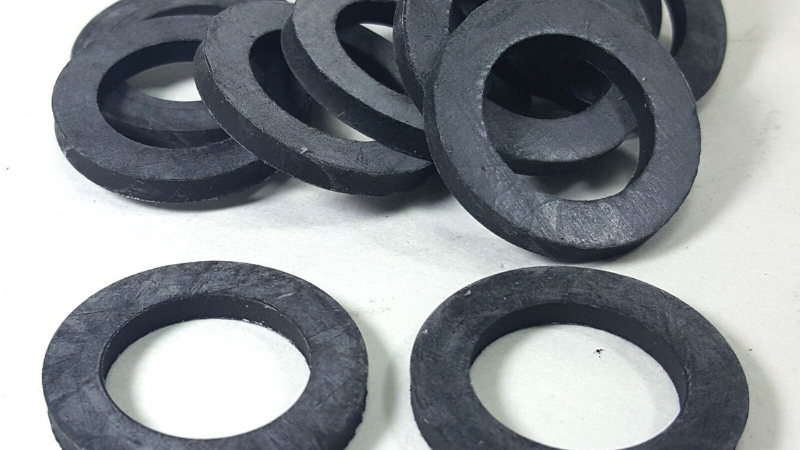
As mentioned earlier, EPDM gaskets have different grades and material types. Therefore, a particular type may not be suitable for all applications. Before choosing the right EPDM gasket for your needs, consider the following;
Application Conditions
Does your application require solid or sponge rubber? What is the necessary level of hardness? Does the application need cushioning? The best EPDM gasket for your application should perform well without deforming or leaking. Furthermore, if you use your gasket in a food-processing application, you can’t use just any EPDM gasket. FDA-approved gaskets have been certified safe for use with food.
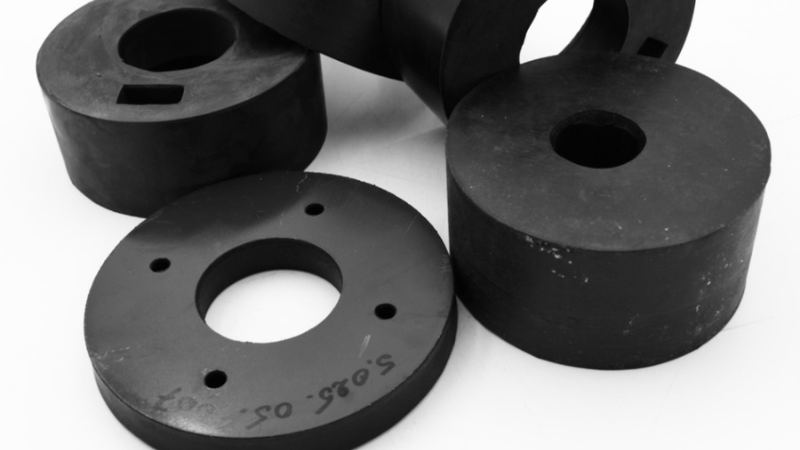
Heat and Chemical Exposure
Although all EPDM gaskets resist high temperatures, they are not all resistant to flame. If your application uses extreme heat, it is best to consider the type of gasket that suits your needs.
In addition, it is best to check your EPDM’s gasket materials’ compatibility with chemicals before using them. For instance, standard EPDM gaskets are not resistant to solvents and specific lubricants. Nevertheless, EPDM resists animal and vegetable oils.
However, peroxide-cured EPDM gaskets are improved and can withstand more chemicals than standard EPDM gaskets.
Fluid Usage
Do you want the fluid in the application to pass through the gasket? Foam gaskets allow fluid to pass through, while solid and sponge EPDM gaskets prevent the free flow of liquids and gases.
Cost
All material types and grades of EPDM gaskets have varying costs. Using gaskets that fit your application while saving you money is best. It is also essential to consider the availability of the gasket, as this can impact the overall cost and time of production.
Conclusion
Different grades and material types of EPDM gaskets affect the performance and conditions the gasket is suitable for. Before choosing a gasket, you must consider your application’s operating conditions, cost, and chemical usage. EPDM gaskets are generally resilient and possess good tensile strength and excellent weathering, ozone, and temperature resistance
Hongju Manufactures EPDM Gaskets!
Hongju is a leading gasket and silicone rubber solutions manufacturer with decades of experience in the industry. We have exceptional molding capabilities to produce custom rubber products to meet your needs. From gasket sealing solutions to o-rings, we offer competitive prices and a fast turnaround.
In addition, our excellent customer service is available round the clock to attend to your needs in the best possible way. We are ready to work with you to produce high-quality products to meet your needs.
Kindly reach out today!